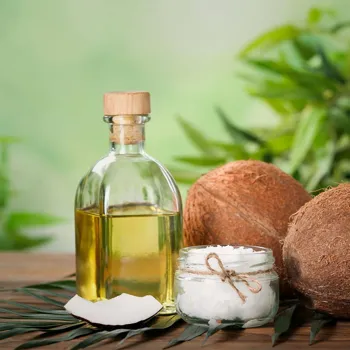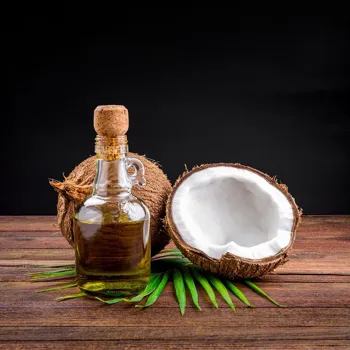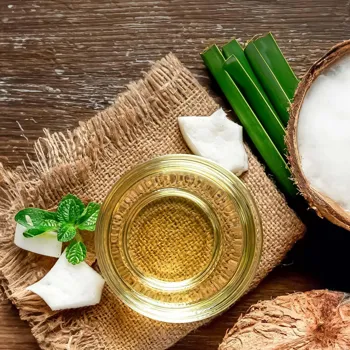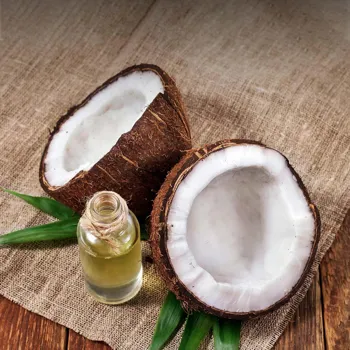Unveiling Coconut Oil: Superfood or Hype? Dive into 7 Facts! Discover its benefits, risks, and uses. Read on for insights
For generations, coconut oil has been a staple in Indian households, used for everything
from cooking to hair care. But in recent years, it's gained global recognition as a "superfood," touted for its potential health benefits.

But is this tropical treasure truly the miracle cure it's made out to be? Let's dive into the facts and separate the hype from the reality.
Coconut oil's MCTs offer quick energy, but not as potent as MCT oil
One of the main reasons coconut oil is considered special is its high content of Medium-Chain Triglycerides (MCTs). Unlike long-chain triglycerides (LCTs) found in most other fats, MCTs are metabolized differently by the body.

They are directly absorbed from the intestine and sent to the liver, where they can be used as a quick source of energy or converted into ketones. This unique metabolic pathway is what fuels many of the purported benefits of coconut oil.
The theory is that instead of being stored as fat, MCTs are readily burned for energy, potentially aiding in weight management. Some studies suggest that MCTs can also boost cognitive function and improve athletic performance.
However, it's important to note that the MCT content of coconut oil is not uniform. It primarily contains lauric acid, which behaves more like an LCT than a true MCT. While lauric acid does have its own potential health benefits, it may not provide the same immediate energy boost as other MCTs.
The key takeaway here is that while coconut oil is a good source of MCTs, it's not a concentrated source like MCT oil, which is specifically designed to contain a higher proportion of shorter-chain MCTs.
Coconut oil's impact on heart health debated due to high saturated fat content
While coconut oil has gained popularity, some experts raise concerns about its impact on heart health. This is primarily due to its high saturated fat content. For years, saturated fats were demonized as being major contributors to heart disease.

However, recent studies have challenged this view, suggesting that the relationship between saturated fat and heart health may be more complex than previously thought. Nevertheless, it's undeniable that coconut oil is loaded with saturated fat – even more so than butter or lard.
Saturated fat can raise levels of LDL cholesterol, often referred to as "bad" cholesterol. High LDL cholesterol levels can increase the risk of plaque buildup in the arteries, leading to heart disease and stroke.
However, coconut oil may also raise HDL cholesterol, the "good" cholesterol, which helps remove LDL cholesterol from the arteries. The overall impact of coconut oil on heart health likely depends on individual factors, such as genetics, overall diet, and lifestyle.
If you have existing heart conditions or risk factors, it's best to consult your doctor before incorporating large amounts of coconut oil into your diet.
Coconut oil's high smoke point is ideal for Indian cooking
Coconut oil has a relatively high smoke point, which makes it a suitable choice for cooking at high temperatures, such as frying or sautéing. The smoke point is the temperature at which an oil starts to break down and release harmful compounds.

Oils with low smoke points can become unstable at high temperatures, producing potentially carcinogenic substances. Coconut oil's higher smoke point makes it a more stable option for high-heat cooking compared to some other vegetable oils.
This is especially important in Indian cuisine, where frying and tempering (tadka) are common cooking techniques. However, it's important to remember that even with a high smoke point, it's always best to avoid overheating any oil.
Overheating can still lead to the formation of harmful compounds, regardless of the oil's initial smoke point. Therefore, it's crucial to use moderate heat and avoid letting the oil smoke excessively.
Coconut oil benefits for skin and hair care
Beyond the kitchen, coconut oil shines as a natural beauty ingredient. It's been used for centuries in India and other tropical regions for its moisturizing and protective properties. Coconut oil is an excellent emollient, meaning it helps to soften and hydrate the skin.

It forms a protective barrier on the skin's surface, preventing moisture loss and keeping the skin supple. This makes it beneficial for dry skin, eczema, and other skin conditions. For hair care, coconut oil can help to reduce protein loss, strengthen the hair shaft, and add shine.
It penetrates the hair shaft more effectively than many other oils, providing deep conditioning and preventing breakage. It can be used as a pre-shampoo treatment, a leave-in conditioner, or a hair mask. However, it's important to note that coconut oil may not be suitable for all hair types.
People with fine or low-porosity hair may find that it makes their hair feel heavy or greasy. It's always best to test a small amount on a small section of hair before applying it all over.
Coconut oil's lauric acid fights infections, but not a replacement for medical treatment
Coconut oil contains lauric acid, which has been shown to have antibacterial and antifungal properties. Lauric acid can disrupt the cell membranes of certain bacteria, viruses, and fungi, inhibiting their growth and spread.

This makes coconut oil a potential natural remedy for minor skin infections, such as athlete's foot or ringworm. It can also be used as a natural mouthwash to help kill bacteria and freshen breath.
Some studies have even suggested that coconut oil may be effective against antibiotic-resistant bacteria. However, it's important to note that coconut oil should not be used as a substitute for conventional medical treatments. If you have a serious infection, it's essential to consult a doctor.
MCTs in coconut oil aid weight management but must be consumed in moderation for effectiveness
The MCTs in coconut oil may contribute to weight management by increasing satiety and boosting metabolism. MCTs are metabolized differently than other fats, leading to a greater feeling of fullness after meals. This can help to reduce overall calorie intake and support weight loss.
Additionally, some studies suggest that MCTs can increase energy expenditure and fat burning, further aiding in weight management. However, it's important to remember that coconut oil is still a high-calorie food. Overconsumption of any fat, including coconut oil, can lead to weight gain.
Therefore, it's crucial to use coconut oil in moderation as part of a balanced diet and exercise plan.
AI Generated Content. Glance/InMobi shall have no liability for the content






















